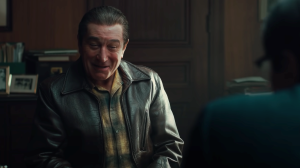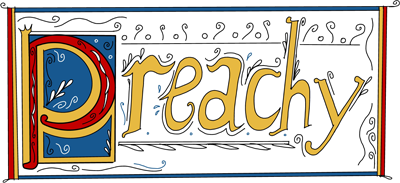
Solace and Spirituality in Scorsese
 Martin Scorsese’s Mean Streets starts with a blank screen, and then a sermon: “You don’t make up for your sins in church. You do it in the streets. You do it at home. The rest is bullshit and you know it.” Later, we see Harvey Keitel as Charlie, the tortured protagonist of the movie, in a church on his knees, surrounded by saints, trying to cover his bases anyway. Maybe he believes what’s being said in the opening moments of the film, but regardless, he’s still compelled to do right in church and the streets.
Martin Scorsese’s Mean Streets starts with a blank screen, and then a sermon: “You don’t make up for your sins in church. You do it in the streets. You do it at home. The rest is bullshit and you know it.” Later, we see Harvey Keitel as Charlie, the tortured protagonist of the movie, in a church on his knees, surrounded by saints, trying to cover his bases anyway. Maybe he believes what’s being said in the opening moments of the film, but regardless, he’s still compelled to do right in church and the streets.
Mean Streets, Scorsese’s first feature, might be his most straightforward film. It might also offer the clearest thesis on his own experiences with Catholic guilt. This thread, of struggling with guilt and penance and what it means to do right in his films has stuck with me and helped me with my own struggles with faith — namely, knowing when to let go of the guilt that isn’t serving me or my growth anymore.
Scorsese was born to an Italian-American family in New York in 1942. In his home in Little Italy, he was shaped by both the violence and faith that surrounded him. Scorsese was a devout Catholic who tried to become a priest. He didn’t make it past his first year in preparatory seminary, so he decided to make movies, instead.
I grew up Catholic, too. I’m from South Texas, raised in a Mexican-American household, and Roman Catholicism has run through my life in streaks both good and bad over the years. It has comforted me in times when things feel out of my control, and it has given me nightmares straight out of the Book of Revelations: when I was a small girl, I’d sit in the pews and break into a nervous sweat when the priest talked about the dragon with ten horns and seven heads, and then dream about everything I loved crumbling under its grip. But I have also found calm and healing in saying a Hail Mary or Our Father or just speaking plainly to God in my own way when I hit a wall in my life.
This thread of faith is where I find kinship and solace in Scorsese’s movies. Maybe I don’t understand what it’s like to be a small-time mobster trying to do right, but I do know what it’s like to struggle with faith and morality in an increasingly complicated world — to want to do your best in your own way, but without knowing whether you’re going about it in the right way, or if it’s good enough to save you in the end.
The people who make up the worlds of Scorsese films are, to say the least, morally ambiguous characters, but they are often trying to do right by themselves, the people they love, or their faith. Frank Sheeran in The Irishman, Scorsese’s latest, spends most of his life thinking he’s doing right by his family and the mobsters he works for. He is a hitman, “painting houses,” and does it very well, too. Sheeran befriends and betrays people, including mobster Russell Buffalino and Jimmy Hoffa, all in the name of doing right by them, but also mostly himself. “You followed orders. You did right. You get rewarded,” an older Sheeran explains to us as we learn about his beginnings as a hitman. However, these rewards only last so long, and can’t assuage the built-up guilt and trauma of Frank’s work.
The same goes for Charlie in Mean Streets. Working in the criminal underworld, navigating the lines between what he owes the people in his life and what he owes himself and his spirituality makes for a torturous end. After getting shot while trying to help his girlfriend and a reckless friend run away, all Charlie has left is pain — spiritual and physical. Earlier in the film, Charlie talks about his deep fear of eternal pain: “Now, ya don’t fuck around with the infinite. There’s no way you do that. The pain in hell has two sides. The kind you can touch with your hand; the kind you can feel in your heart… your soul, the spiritual side. And ya know… the worst of the two is the spiritual,” he says in voiceover as he wanders through a church. It seems that the physical and the spiritual pain of his life will be with him forever. A terrible fate.
Fear of pain, eternal and temporary, has shaped my relationship with my Catholicism over the years. Am I leading a good life, even when I’m lacking in faith sometimes? The question of doing enough, of avoiding pain, of being a good person, has been one that has been with me since I was a 10-year-old taking CCD classes. During one retreat, my classmates and I sat with balloons and markers in hand and wrote the sins we’d committed on them. I sat with my balloon a long time, taking a personal inventory of things I’d done wrong. I looked around, huddled around my balloon, scared that anyone but the Lord would see my failings so plain, and then let them go into the searing South Texas air with everyone else.
Late in The Irishman, Frank Sheeran is at the end of his life and alone. And so fixed, he’s forced to confront the sins of his life. From a retirement home chapel, he confesses to a priest about everything. We don’t see the confession, but we do see Frank and the Father praying together after. “We come to you, sinful and sorrowful,” the priest says, as Frank weakly echoes him. The last scene of the movie has the same priest and Frank praying together again until Frank is left alone in his room for the last time. Despite his last-ditch attempts to open up and make amends for his past, we never learn whether Frank gets his salvation — another terrible fate.
I’ve found a kind of solace in both Mean Streets and The Irishman. I’ve carried all kinds of Catholic guilt with me at various points in my life. However, I have a loving community to help me let go of guilt and grief when it becomes too much. Charlie and Frank’s stories help me remember that holding on to guilt by yourself is not the same as keeping faith, even when the two can feel intertwined. Scorsese himself, in an interview with La Civillita Cattolica, a Jesuit publication based in Rome, said:
“Accepting yourself, living with yourself, possibly becoming a force for something positive in people’s lives. I suppose that’s one way of defining salvation. It comes down to the people you love: your family, your friends, your loved ones. You try to be as good as you can, and as reasonable and compassionate as you can… For me, day and night, there are peaks and valleys, constant exhilaration and darkness, a doubting that becomes self-criticism. But you can’t overdo that because, again, you have to accept yourself. So it’s an ongoing process.”
As Mean Streets and The Irishman remind me, all we can do is keep moving forward through the uncertainty and pain of the world, and keep trying to do right as best we can: by our communities (both religious and secular) and by ourselves. Then, maybe, salvation can follow.
Author’s Note: You’ll notice that there is no discussion of Martin Scorsese’s more outwardly religious films such as The Last Temptation of Christ or Silence in this piece. I chose to discuss Mean Streets and The Irishman specifically because they feel more grounded in my own experiences with Catholicism.
Alejandra Martinez is a Tejana archivist, writer, and film lover based in Austin, Texas. You can find her assorted ramblings about coffee, movies, and more on Twitter: @mtzxale
